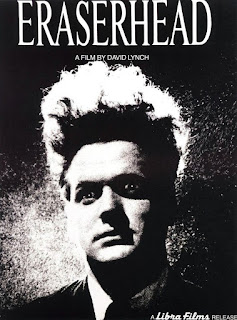Eraserhead (1977)
David Lynch is almost expected these days to produce a movie that is made up of strange scenes that barely fit together as a whole. That is strange since early Lynch, including Eraserhead, is pretty straightforward in its approach to film making. Keep in mind that after presenting what is a unique vision of his own his next two movies were The Elephant Man and Dune. Both had elements that were definitely Lynch, but were in no way as tricky a narrative as later movies like Lost Highway. The next movie he wrote on purely original idea of his own - Blue Velvet - didn't really stray from a traditional narrative either.
I understand how many people who have seen the film would wonder how Eraserhead can be considered a traditional narrative. While it is surreal, recalling often in both style and humor the short films that Salvador Dali and Luis Buñuel made together, it has a rather clear plot - only that it is distorted by the fact that the main character is dreaming it. Many critics, and many viewers, happen to take the events happening at face value, or that it is exaggerated situations based on David Lynch's personal issues about settling down and raising a family. While some of his own past anxieties may have gone into this (his daughter Jennifer was three years old when he began making this, so he was already past the initial stage of dealing with an infant), Eraserhead is not so much a personal meditation on fears as it is a representation of what many young men go through when adulthood stares them straight in the face.
Henry Spencer (Jack Nance) is on vacation from his printing job. He comes home and is informed by the Beautiful Girl Across the Hall (Judith Roberts) that his girlfriend Mary (Charlotte Stewart) has called and asked him to come to dinner. After a strange dinner with Mary's mother (Jeanne Bates) and father (Allen Joseph), he finds out that Mary has had a child and he is expected to marry her. The child is a deformed, alien-looking creature that constantly cries, eventually driving a wedge between the two.
Eraserhead is rather simple despite all the tangents the movie explores. It is also a concise, well-made film despite taking five years to make. What many people take away from it is both the baby and the the jarring strangeness, which features a couple of dream sequences, one of which involves a Lady in the Radiator (Laurel Near) who assures him that in heaven, everything will be fine.
Instead of taking the narrative at face value the movie needs to be viewed as Henry's nightmare about marriage and parenthood. Mary and the baby both fade in and out of the narrative at different points as it goes along and, as Henry approaches a point where he is going to wake up, things become more and more fragmented. His erotic encounter with the lady across the hall, the Lady in the Radiator and in fact the whole Dickensian dream within a dream that gives the movie its name all diverge from the main theme of the dream just as dreams tend to do in real life - even to the point of awakening back into the dream and mistaking it for reality. It also puts the ending in a different perspective.
To further emphasize this phantasmagorial state the soundtrack contains little music, but instead ambient industrial sounds, such as might break through into the subconscious while sleeping. The real Henry Spencer may or may not live in a similar industrial wasteland as the movie takes place, or it may be a memory. The real-world inspiration was a bad neighborhood in Philadelphia that Lynch grew up in, and it always seems to be childhood memories that stick and manifest themselves repeatedly in adult dreams.
The strange images, and in many ways Henry Spencer's otherworldly yet nebbish appearance, appealed to both the midnight movie crowd and the budding punk aesthetic. Jack Nance's hunched, constantly put-upon performance is striking, but Lynch also manages to weave in homages to science fiction as well as silent comedy films. The baby itself may or may not have been an organically based puppet, but it is an amazing practical effect given what Lynch had to work with. Images such as the Man in the Planet (Jack Fisk), with the broken window and the industrial levers that represent Henry's reproductive system, and the events in the pencil factory are examples that show Lynch's talent for visual art.
Needless to say Eraserhead may have a pretty straightforward narrative when dissected, but it is not for everyone. If Lynch's films such as Blue Velvet, Lost Highway or Mulholland Drive do not get one interested in seeing more of Lynch's filmography then, simply, this is not going to change any minds. The only thing a non-fan of Lynch's will appreciate is that Eraserhead is a lot shorter than many of his later films and, surprisingly, the acting is lot less zombie like. Still, this movie was good enough to convince Mel Brooks to sign Lynch as the director for The Elephant Man, a movie that quickly became a sensation and opened the door to more mainstream opportunities.
Eraserhead (1977)
Time: 89 minutes
Starring: Jack Nance, Charlotte Stewart
Director: David Lynch




Comments
Post a Comment